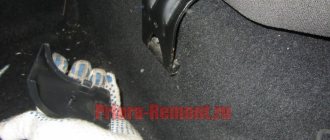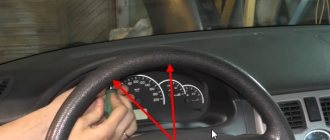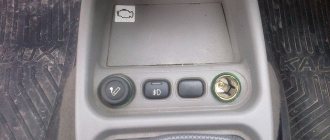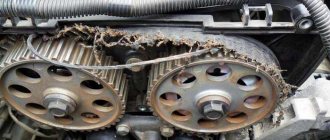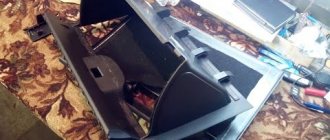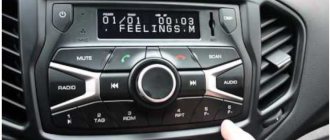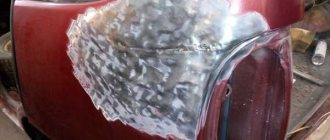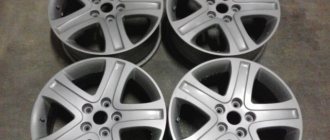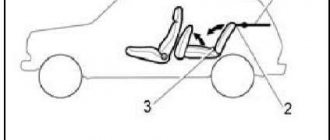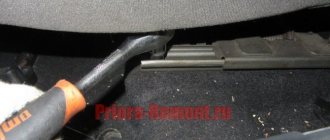How to fold a seat in a field?
To seat passengers in the rear seat (option for a car with a 3-door body), move the front seat backrest release button 2 up and move the backrest forward as the vehicle moves, and then move the entire seat forward, increasing the space for passengers to access the rear seat.
Interesting materials:
How to return erroneously transferred money to a tele2 phone? How to return the keyboard layout on your phone? How to return an old update to a Xiaomi phone? How to return the old screensaver to your phone? How to return to the old phone firmware? How to enable Alice on your phone? How to enable Alice on a locked phone? How to enable Auto-correct on your phone? How to enable auto-rotate on your phone? How to turn on a phone without a battery?
Front seats
The front seats can be removed regardless of the Priora body type, that is, the seats will be removed the same way on all types of cars.
In order to get started, you need to prepare the tool.
To remove the front seats of the Priora you will need:
- Ratchet;
- Torx head E10;
- Head for 10 and 13 mm;
After preparing the tool, you can begin to work.
Removal process
- Initially, you need to disconnect all wires connected to the seat, such as heated seats and the seat belt indicator. We find these connectors under the seat and disconnect them.
- Remove the springs pushing the seat forward numbered 1 and 2 by pulling them up from the plastic retainer.
- Next, use a 13 mm socket to unscrew the 4 nuts securing the front part of the seat.
- Then, using a torx E10 head, unscrew the 5 bolts securing the slide.
- We take out the seat through the front door of the car.
Installation is carried out in reverse order.
Electromagnetic relay
An electromagnetic relay is a switching device designed to relieve contacts. The work is based on the law of electromagnetic induction.
In cars, relays are used to unload contacts on control buttons, so that they, in turn, do not melt or heat up when more current appears on them. The relay consists of moving and non-moving contacts, a DC coil, a return spring, a coil core and an armature.
Relay operating principle
When a current appears on the relay coil, a magnetic field is formed in it, which in turn begins to attract the armature to which the movable contacts of the relay are attached. As a result, the moving contacts close with the fixed ones and the electrical circuit is completed.
Tips from Loganovodov
Some of the Logan owners have long been accustomed to transporting large-sized cargo using the above method, but in addition to all of the above, they share their advice:
If you frequently need to carry loads, simply do not tighten the bolts that secure the backrest. Without them, the removal process is reduced significantly, and without them the back will not go anywhere. But the bolts should be kept in a safe place just in case.
Sources:
https://avtotehpomosch-kruglosutochno.ru/diagnostika-i-remont/kak-snjat-zadnee-sidene-na-priore.html https://mirjetta.ru/voprosy-i-otvety/kak-snyat-zadnee-sidene / https://priorik.ru/podogrev-sidenij-lada-priora-polomki-instruktsiya-ustanovki/ https://carfrance.ru/snimaem-zadnee-sidene-na-reno-logan/
Rear seats
The rear seats will differ in dismantling depending on the Lada body type. Therefore, we will consider each body type.
Sedan
- In a sedan, the rear seat can be removed much faster than in other body types. To remove the sofa, you need to press on the locks located on the edges of the sofa and lift it up. After which the sofa can be removed from the car.
- The backrests of the rear sofa can be removed by opening the lock located behind the rear headrest. To do this, you need to pull the lock loop and tilt the backrest forward. After which the back is removed from the hooks.
Hatchback and station wagon
- In these types of bodies, the sofa is divided into two parts, each part is attached to two hinges that are screwed to the body with an M6 bolt with a 10mm head.
- To dismantle, you need to pull the loop and open the lock securing the sofa. Then unscrew the 4 bolts and remove both parts of the sofa from the hinges.
see also
Comments 21
yeah, only these ropes tend to fall to the bottom and have to be pulled out of the trunk with a screwdriver. They really couldn’t come up with anything more serious.
yes yes, they wrote about it. Apparently I didn't have enough imagination =)
To be honest, it’s better not to touch the backrest unless absolutely necessary, the rear backrest locks are made of such rubbish that after opening the closures a few times they will stop latching…
To be honest, it’s better not to touch the backrest unless absolutely necessary, the rear backrest locks are made of such rubbish that after opening the closures a few times they will stop latching…
I'll keep that in mind, thanks!
If the straps fall, then pass a thin wire into the trunk and hook it to the straps there. Pull them into the cabin and open it. But it doesn’t fold up, it can be removed (the back) You’ll shoot it when you fold back the 2 buttons of the trim and see 2 hooks at the bottom
Thank you! I'll keep it on mind. but I would like to hope that they still didn’t fail =)
The only catch is that the trunk upholstery is riveted to the backrests.
This is how... it turns out that they will need to be “unriveted?” Are they holding tightly?
To be honest, I don’t even know, but I reclined the seats a couple of times and 3-4 rivets vomited out. I didn't try to fasten them back.
Relay and fuse blocks on a LADA Priora car
The VAZ Priora passenger car, regardless of the type of engine installed, is equipped with several junction boxes. They are located under the hood and inside the car. The use of several boxes made it possible to separate circuits with high and low currents. In addition, separate small-sized mounting blocks were installed, introduced as the configuration expanded.
Main power fuse block
The vehicle's power circuits are protected by inserts installed on the positive terminal of the battery. The block is designed to protect circuits with maximum currents. To gain access to the fuses, you need to remove the plastic cover; this can be done without the help of tools.
Block diagram and its location in the car
The removal of the most powerful circuits on the Lada Priora into a separate unit located close to the battery ensured maximum protection of the car's electrical system from overloads.
The location and designation of the inserts is indicated in the photo. Depending on the year of manufacture and installed equipment, it is possible to install fuses of different ratings.
Priora power insert block
Tip 4: How to remove roof trim in Priora
Fans of the Lada Priora like everything about the car, but they also notice that the car’s ceiling lining is rapidly wearing out. In order to update the ceiling by covering it with a different covering, you must first remove the dilapidated roof. But how to do that?
You will need
- -screwdriver;
- -wrench.
Priora engine compartment photo
The small class car VAZ-2170 Lada Priora with a four-door sedan body (class C according to the international classification) is designed for operation at ambient temperatures from -40 to +50 °C on public roads with hard surfaces.
The Lada Priora is equipped with an injection 16-valve engine mod. located across the engine compartment. VAZ-21126-00 with a working volume of 1.6 liters. The engine is equipped with a distributed fuel injection system and an exhaust gas catalytic converter, structurally made in a single block with the exhaust manifold (catcollector).
The body is load-bearing, all-metal, of welded construction, with hinged doors, front fenders, hood and trunk lid.
The driver's seat of the Lada Priora is equipped as standard with an airbag, and in an optional version - with a front passenger airbag, as well as front seat belts with pretensioners and load limiters, which significantly reduces the likelihood and severity of head and chest injuries in a traffic accident.
The airbag only deploys when there is a strong impact to the front of the vehicle. In minor frontal impacts, vehicle rollovers, rear or side impacts, seat belts are the primary means of protection.
The transmission is made according to a front-wheel drive design with drive wheels of different lengths.
The front suspension is independent, spring, with anti-roll bar, with hydraulic shock absorber struts. The rear suspension is semi-independent, lever-spring, with hydraulic shock absorbers.
The front wheel brakes are disc brakes with a floating caliper, the rear wheels are drum brakes.
In a variant version, Lada Priora cars are equipped with an anti-lock brake system, which prevents wheel locking during braking and maintains controllability and directional stability.
The steering is injury-proof, with a rack-and-pinion steering mechanism, with an electromechanical booster that changes the transmitted torque depending on the speed of the vehicle.
Lada Priora cars are equipped with a remote control system for locking or unlocking door locks (in an optional version and locking the trunk lid lock) with simultaneous activation or deactivation of the vehicle security mode. In addition, remote activation of the alarm system in case of violation of vehicle security zones and blocking of all doors by pressing a button from inside the vehicle are provided.
This system also includes an electronic engine locking system (immobilizer), which provides additional protection against unauthorized engine starting.
The overall dimensions of the car are shown in Fig. 1.4, technical characteristics are given in table.
Elements of the engine compartment of the VAZ-2170 Lada Priora are shown in Fig. 1.5, the location of the main components and assemblies is shown in Fig. 1.6 and 1.7.
Figure 1.4. Overall dimensions of the Lada Priora car (mm)
Figure 1.5. Engine compartment of the car:
1 - engine; 2, 14 — power unit supports; 3 — steering mechanism; 4 - throttle assembly; 5 — reservoir of the main brake cylinder; 6 — expansion tank of the engine cooling system; 7 — main fuse block; 8 — washer reservoir; 9 - battery; 10 — air filter; 11 — mass air flow sensor; 12 - alarm signal; 13 - generator; 15 — hood stop
Figure 1.3. Location of the main components of the vehicle components (bottom front view, engine splash guard removed): 1, 3, 13 — power unit supports; 2 - generator; 4 — radiator of the engine cooling system; 5 — electric fan of the engine cooling system; 6 - starter; 7 — cross member of the front suspension; 8 — front suspension extension bracket; 9 — front suspension stretch; 10 — shock absorber strut of the front suspension; 11 — stabilizer strut; 12 — left front wheel drive; 14 — gearbox; 15 — exhaust pipe of an additional muffler; 16 — engine oil sump; 17 — catalytic collector; 18 — right front wheel drive; 19 — anti-roll bar; 20 — front suspension arm; 21 — front wheel brake mechanism
